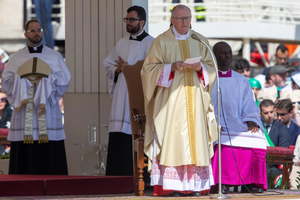As Cardinal Zen and Jimmy Lai Cases Attest, the Vatican Must Change Its Course With China
COMMENTARY: The Holy See must denounce the Chinese government’s ongoing human rights injustices with unequivocal language.

It’s pretty easy for Americans to take religious freedom for granted. The same can’t be said for people living in China. Under President Xi Jinping, the Chinese Communist Party has developed a pathological suspicion of religious belief.
The mainland Chinese have never enjoyed either religious or political freedom.
I was reminded of this over Thanksgiving dinner, when I met an extraordinary man who was known in his native China as a “barefoot lawyer” — that is, a legal activist with no formal training. Chen Guangchen amazingly taught himself law despite being blind since birth. While living in China, he criticized the enforcement of China’s one-child policy. The result: over four years in jail.
After Chen was released, he and his family were kept under intense police surveillance. Now they live in the Washington, D.C. area, where Chen is a distinguished fellow at The Catholic University of America. His message, repeated several times during dinner: “The Chinese Communist Party will always give you trouble.”
This might seem like a statement of the obvious, but it’s a message that the Vatican has been slow to absorb. Earlier this month, Pope Francis gave an interview to America magazine in which he defended the often-debated Rome-Beijing pact of 2018, which is supposed to recognize his authority over the Catholic Church in China while giving the government the right to nominate bishops for his consideration.
“With China, I have opted for the way of dialogue. It is slow, it has its failures, it has its successes, but I cannot find another way,” said the Pope.
But, as Father Raymond de Souza commented in the Register, “The interview was done two days before the Chinese regime installed a bishop of an existing diocese as the new regime-approved bishop of a diocese which does not exist, i.e., it was created by the Chinese Communist Party, which has authority over religious matters. The move leaves the recently-renewed secret agreement in tatters. The path of dialogue in China appears closed.”
It goes without saying that there is no easy solution. But that does not mean that the Vatican cannot change course. Indeed, it is morally obliged to do so as soon as possible with respect to one subject: the treatment of Catholics in Hong Kong, which unlike the mainland has enjoyed a large measure of political and religious freedom. That freedom is now being snuffed out, as the cases of Cardinal Joseph Zen and Jimmy Lai illustrate.
Cardinal Zen, the 90-year-old retired bishop of Hong Kong, has just been convicted of failing to register a humanitarian relief fund and fined a little more than $500 for supporting pro-democracy demonstrators during the mass protests in Hong Kong in 2019. That may sound a relatively light punishment compared to the life imprisonment with which he was threatened for allegedly working with foreign agents, but it establishes a sinister precedent: Charities in Hong Kong are now regarded as potential spies.
Lai, a Catholic pro-democracy advocate and the founder of the Hong Kong newspaper Apple Daily, stands trial soon on charges under the terms of the Hong Kong National Security Law – the same law that was used to threaten Zen. Lai will be tried not before a jury but before three national security judges. He faces a life sentence. on charges under the terms of the Hong Kong National Security Law — the same law that was used to threaten Cardinal Zen. Lai will be tried not before a jury but before three national security judges. He faces a life sentence.
“There is not a man, woman or child in Hong Kong who doesn’t believe the verdict is already in,” writes the Wall Street Journal’s William McGurn, a close friend of Lai.
These cases are especially troubling because the Vatican has not defended either of these two heroic Catholics. When Cardinal Zen visited Rome to try to warn Pope Francis and Vatican officials about any deal with Beijing, he was denied an audience. Asked about Cardinal Zen in a recent interview on the papal plane, the Pope skirted around the subject.
Following Beijing’s entirely predictable decision to renege on the 2018 deal, the Vatican last week issued a cautiously worded but nonetheless firm protest. Now a Chinese foreign ministry spokesman has said that “China is willing to continuously expand the friendly consensus with the Vatican side and jointly maintain the spirit of our interim agreement.”
This may or may not mean anything, but it does suggest that Beijing is embarrassed when Rome decides to protest rather than merely submitting to a “dialogue” whose terms are dictated by the Chinese. We must pray that the Vatican’s Secretariat of State will pursue a new policy of speaking out when it is openly humiliated and the human rights of Catholics spectacularly violated.
If, as expected, the show trial of Jimmy Lai ends in his life imprisonment, the Vatican must denounce this injustice in unequivocal language. And, if it does not, Catholics must make their voices heard.








![“Approximately 1 in 7 Christians [more than 365 million people] are subject to significant levels of persecution on the basis of religious beliefs. The number of attacks against Christian churches and property increased significantly in 2023, with more Christians than ever suffering violent attacks,” said Vatican Secretary of State Cardinal Pietro Parolin during his Sept. 28, 2024 address to the United Nations General Assembly. “Approximately 1 in 7 Christians [more than 365 million people] are subject to significant levels of persecution on the basis of religious beliefs. The number of attacks against Christian churches and property increased significantly in 2023, with more Christians than ever suffering violent attacks,” said Vatican Secretary of State Cardinal Pietro Parolin during his Sept. 28, 2024 address to the United Nations General Assembly.](https://publisher-ncreg.s3.us-east-2.amazonaws.com/pb-ncregister/swp/hv9hms/media/20241001151044_56335de4b5e2b8d679394622f4490e22c309dabab1ba06be3ca44b0dc7662cb4.jpg)






